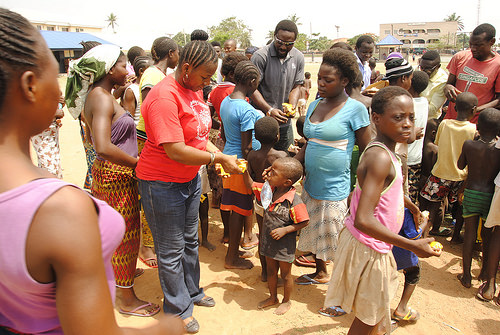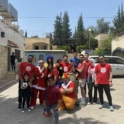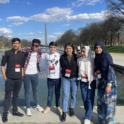West Bank YES alumni organized a GYSD event for orphaned children.
STORIES
Helping Internally Displaced Persons in Nigeria

When we think of refugees, the image that most often comes to mind is the person fleeing their country and seeking safety within another country. Whether that image be the recent Syrian refugees entering European countries or lost boys of Sudan coming to the United States during the Second Sudanese Civil War (1983 to 2005), the people who are often forgotten are those who are not able to leave their home countries as they attempt to flee violent conflicts. The term used to describe these people is Internally Displaced Persons (IDPs). The current conflicts in Nigeria involving attacks by the militant group Boko Haram has brought to light the plight of IDPs in that country.
As of April 2015, Internal Displacement Monitoring Centre (IDMC), an independent, non-governmental humanitarian organization based in Norway, estimated that 1.5 million people who have been forced to flee their homes in Nigeria are still living in internal displacement. This figure includes people displaced as a result of brutal attacks by members of Boko Haram in northeastern Nigeria, ongoing inter-communal clashes and natural hazard-induced disasters.
On Nov. 23 of this year, the Speaker of the Nigeria National House of Representatives, Yakubu Dogara noted that 68 percent of IDPs in Nigeria are children, including some 60,000 babies born within the IDP camps so far. Women and children in IDP camps are extremely vulnerable and often exposed to potential exploitation through sexual abuse and human trafficking. According to Speaker Dogara, “To be displaced from your home is not only dangerous but also one of the most degrading and humiliating experiences that can befall a human being.”
Throughout 2015, YES alumni and IRIS staff in Nigeria recognized this crisis and the hardships these people face and wanted to do something. In three different states, IRIS’ YES alumni found ways to help IDPs of their country weather these hardships and have brought hope to those who felt hopeless.
 In Kaduna State, YES alumni provided much needed hygiene supplies to the overcrowded Mando refugee camp and spoke to women and young adults on the importance of sanitation and personal hygiene. The alumni joined them in cleaning areas of the camp and distributed donated items including food, soaps, candies and clothing to the women and children.
In Kaduna State, YES alumni provided much needed hygiene supplies to the overcrowded Mando refugee camp and spoke to women and young adults on the importance of sanitation and personal hygiene. The alumni joined them in cleaning areas of the camp and distributed donated items including food, soaps, candies and clothing to the women and children.
In Bauchi State, YES alumni organized a project called “The Good Deed” to reach out to the Internally Displaced Persons (IDPs). Over the past few years, thousands of families have been forced out of their homes and communities in Northeastern Nigeria have been living in rural camps in this state since. They lack basic necessities, especially the women and children who dominate the camps. The YES alumni contacted young people through the secondary schools within the city of Bauchi, soliciting donations of food, clothes, shoes, money etc. Within a couple days, students and alumni gathered hundreds of donations, which were distributed to nearly 200 people. They expressed great joy and gratitude and noted that they had never before received such an act of kindness by either the government or any other organization.
 In Benue State, YES alumni not only assisted IDPs by providing donated relief materials such as anti-malarial drugs, hygiene materials, detergents, food items and soccer balls for recreation, but also worked with a group of psychotherapists to counsel the women, men and children dealing with post-traumatic stress. The therapists engaged with the internally displaced persons, especially children, to provide them reassurance that things will get better and instill hope they will be able to return to their homes in the near future.
In Benue State, YES alumni not only assisted IDPs by providing donated relief materials such as anti-malarial drugs, hygiene materials, detergents, food items and soccer balls for recreation, but also worked with a group of psychotherapists to counsel the women, men and children dealing with post-traumatic stress. The therapists engaged with the internally displaced persons, especially children, to provide them reassurance that things will get better and instill hope they will be able to return to their homes in the near future.
Republished from IRIS's Blog.





